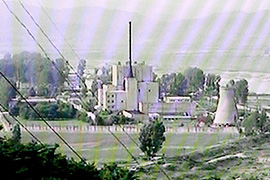N Korea lifts ban on UN inspectors
Decision follows announcement that Pyongyang will resume nuclear-programme dismantlement.

Reactivation threat
Up to late last week, the North had threatened to reactivate the plutonium reprocessing plant at the Yongbyon site.
It told International Atomic Energy Agency (IAEA) inspectors to remove the organisation’s seals and subsequently banned them from monitoring first the plant and then all the facilities located at the sprawling site.
The North rescinded all inspection rights on Thursday, but the three-member IAEA team had been allowed to stay on at their guesthouse in Yongbyon.
 |
| North Korea’s Yongbyon nuclear complex has been at the heart of the controversy [EPA] |
And one of the diplomats told The Associated Press news agency that Pyongyang approved visas late last week for members of a new team once the tour of those on location is over – even as it appeared to be making moves to restart its atomic activities.
That suggested that the North’s threat to stop dismantling its nuclear programme and restart it was a negotiating ploy meant to wrest concessions from its five interlocutors engaging the reclusive communist country on the issue.
North Korea stopped scrapping its nuclear programme in mid-August in anger over Washington’s failure to remove the government from the terror list and began moves toward restarting its plutonium-producing facility.
The US had said North Korea first had to allow verification of the declaration of its nuclear programmes it submitted in June.
In de-listing North Korea on Saturday, Washington said Pyongyang had agreed to all its nuclear inspection demands.
Six-party talks
The de-listing is expected to prompt the US, the Koreas, China, Russia and Japan to reconvene the stalled six-party talks aimed at persuading Pyongyang to abandon its nuclear programmes in return for energy aid and other benefits.
The delisting came after days of intense internal debate in Washington and consultations with US negotiating partners.
But Japan’s finance minister branded the decision “extremely regrettable”, Japanese media reported on Sunday.
“It’s extremely regrettable, and I believe abductions amount to terrorist acts,” Shoichi Nakagawa said in Washington at the G7 meeting of finance ministers.
“I don’t think the United States made the decision after a close consultation with its ally Japan.”
Monica Villamizar, reporting for Al Jazeera in from Washington, said “it is an unprecedented agreement and very surprising” because of North Korea’s recent expulsion of nuclear inspectors and testing of missiles.